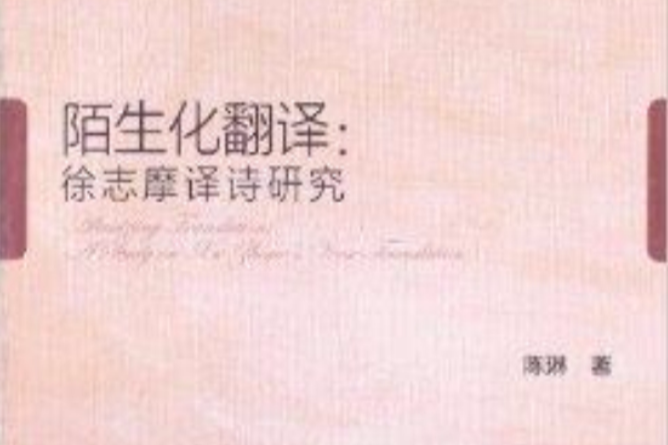《陌生化翻譯:徐志摩譯詩研究》是2012年7月1日中國社會科學出版社出版的圖書,作者是陳琳。
基本介紹
- 外文名:Alienizing Translation:a Study on Xu Zhimo's Verse Translation
- 書名:陌生化翻譯:徐志摩譯詩研究
- 作者:陳琳
- 出版日期:2012年7月1日
- 語種:簡體中文, 英語
- ISBN:9787516112663
- 出版社:中國社會科學出版社
- 頁數:263頁
- 開本:16
- 品牌:中國社會科學出版社
內容簡介,作者簡介,圖書目錄,
內容簡介
陳琳所著的《陌生化翻譯——徐志摩譯詩研究》從哲學的間性概念和翻譯學的系統理論的角度對陌生化詩歌翻譯的概念進行了合理的論證,揭示了徐志摩作為詩人譯詩的翻譯詩學追求,可謂獨闢蹊徑。作者在書中提出徐志摩的有機詩體譯詩雖然在很大程度上違背了翻譯的忠實原則,但是,它反映了在新詩運動背景下罪奔蘭,徐志摩作為一個新格律詩派的開山詩人,藉助譯詩,大膽地抒發其詩情,體現了他對譯詩的詩性的大膽追求,造成陌生化詩歌翻譯的效果,達到了通過譯詩來探尋白話新詩的蘭請協表現力的目的少罪疊獄。
作者簡介
陳琳,博士,同濟大學外國語學院翻譯學教授、博士生導師。兼任中國比較文學學會翻譯研究會理事。主要從事文化學與比較文獄坑學視閾下的翻譯詩學研究。曾在兵辨榜加拿大渥太華大學翻譯與口譯學院任訪問教授凳旋盛艱、美國芝加哥大學比較文學系任富布萊特訪問研究學者。
圖書目錄
Introduction
0.1 Significance of the Research into Xu as a Poet-cum-Translator
0.2 Review of the Research into Xu' s Verse Translation
0.3 Objectives and Research Method
0.4 Composition and Construction
Chapter 1 Social, Cultural, and Personal Background
1.1 Social, Cultural, and Creative Writing Conditions for the Artistic Field in Modern China: Attempts at Westernization
1.2 Translation Agenda in Xu's Day
1.3 Biographical Evidence for Xu' s Disposition of Open-Mindedness to the New
1.4 Xu's Verse Translation Practice and Thinking
1.4.1 Interest in Literary Uniqueness of the Source Text
1.4.2 Translation Ideal versus Formal Shift
1.4.3 Experiment with the Expressivity of Vernacular Chinese
1.5 Summary
Chapter 2 From Defamiliarization to Alienation Effect
2.1 Defamiliarization
2.1.1 Shklovsky' s Definition
2.1.2 Nature of Defamiliarization
2.1.3 Insights into the Novelty of Poetic Language
2.2 Alienation Effect
2.2.1 Brecht' s Definition
2.2.2 Differences between Defamiliarization and Alienation Effect
2.3 Subjective Artistic Nature of Literary Translation
2.4 Summary
Chapter 3 Alienizing Translation
3.1 Definition
3.1.1 Understanding of Defamiliarization in Translation Studies
3.1.2 Working Definition
3.2 Procedures of Alienizing Translation regarding the Ontological Nature of Translation
3.2.1 Alienization Procedure
3.2.2 Hybridization Procedure
主趨愉 3.3 Summary
Chapter 4 Interness as the Philosophical Motivation for Alienizing Translation
4.1 Interness
4.1.1 Interness as the Result of Intersubjectivity
4.1.2 Interness as the Recognition of Cultural Respect and Complement in Translating
4.2 Interidentity of a Poet-cum-translator
4.3 Translational Intersubjectivity between Xu and His Translated Poets
4.4 Inter-textual Reference as a Semiotic Construct
4.5 Interdiscursivity of the Language of Translation, Themes,and Schools of Poets
4.5.1 Hybridization of the Versification of the Classical Regulated Metrical Chinese Verse
4.5.2 Rhymed Verse versus Free Verse
4.5.3 Diversity of Themes and Schools of Poets
4.6 Intergender of the Feminine and Masculine
4.7 Summary
Chapter 5 Alienizing Translation in Relation to the Manipulation of Translation Norms
5.1 Significance of Translation Norms for the Newness Effect of Translation
5.1.1 Complementary Relationship between Toury' s and Chesterman' s Norms
5.1.2 Reader' s Expectations for Newness and Norm-Breaking Translation
5.2 Translation Norms in the Period of Xu's Translation Activity
5.2.1 Translation Norms in the Late Qing Dynasty and Early Republican Period
5.2.2 Norm of the Language of Translation in the 1920s
5.2.3 Translation Norms regarding the Debate on the Language of Translation
5.2.4 Translation Norms of Verse Translation in the 1920s
5.3 Subjection to the Translation Norms for the Alienizing Translation Effect
5.3.1 In Conformity with Initial Norm : Naturalized into Chinese Verse
5.3.2 Subjection to Preliminary Norm and Accountability Norm: Committment to the Movement of the New Poetry and the Crescent Society
5.3.3 Subjection to Textual-Linguistic Norm: Use of Coinage and Vernacular Colloquialism
5.4 Summary
Conclusion
Appendix Xu Zhimo's Verse Translation
References
Afterword
0.1 Significance of the Research into Xu as a Poet-cum-Translator
0.2 Review of the Research into Xu' s Verse Translation
0.3 Objectives and Research Method
0.4 Composition and Construction
Chapter 1 Social, Cultural, and Personal Background
1.1 Social, Cultural, and Creative Writing Conditions for the Artistic Field in Modern China: Attempts at Westernization
1.2 Translation Agenda in Xu's Day
1.3 Biographical Evidence for Xu' s Disposition of Open-Mindedness to the New
1.4 Xu's Verse Translation Practice and Thinking
1.4.1 Interest in Literary Uniqueness of the Source Text
1.4.2 Translation Ideal versus Formal Shift
1.4.3 Experiment with the Expressivity of Vernacular Chinese
1.5 Summary
Chapter 2 From Defamiliarization to Alienation Effect
2.1 Defamiliarization
2.1.1 Shklovsky' s Definition
2.1.2 Nature of Defamiliarization
2.1.3 Insights into the Novelty of Poetic Language
2.2 Alienation Effect
2.2.1 Brecht' s Definition
2.2.2 Differences between Defamiliarization and Alienation Effect
2.3 Subjective Artistic Nature of Literary Translation
2.4 Summary
Chapter 3 Alienizing Translation
3.1 Definition
3.1.1 Understanding of Defamiliarization in Translation Studies
3.1.2 Working Definition
3.2 Procedures of Alienizing Translation regarding the Ontological Nature of Translation
3.2.1 Alienization Procedure
3.2.2 Hybridization Procedure
主趨愉 3.3 Summary
Chapter 4 Interness as the Philosophical Motivation for Alienizing Translation
4.1 Interness
4.1.1 Interness as the Result of Intersubjectivity
4.1.2 Interness as the Recognition of Cultural Respect and Complement in Translating
4.2 Interidentity of a Poet-cum-translator
4.3 Translational Intersubjectivity between Xu and His Translated Poets
4.4 Inter-textual Reference as a Semiotic Construct
4.5 Interdiscursivity of the Language of Translation, Themes,and Schools of Poets
4.5.1 Hybridization of the Versification of the Classical Regulated Metrical Chinese Verse
4.5.2 Rhymed Verse versus Free Verse
4.5.3 Diversity of Themes and Schools of Poets
4.6 Intergender of the Feminine and Masculine
4.7 Summary
Chapter 5 Alienizing Translation in Relation to the Manipulation of Translation Norms
5.1 Significance of Translation Norms for the Newness Effect of Translation
5.1.1 Complementary Relationship between Toury' s and Chesterman' s Norms
5.1.2 Reader' s Expectations for Newness and Norm-Breaking Translation
5.2 Translation Norms in the Period of Xu's Translation Activity
5.2.1 Translation Norms in the Late Qing Dynasty and Early Republican Period
5.2.2 Norm of the Language of Translation in the 1920s
5.2.3 Translation Norms regarding the Debate on the Language of Translation
5.2.4 Translation Norms of Verse Translation in the 1920s
5.3 Subjection to the Translation Norms for the Alienizing Translation Effect
5.3.1 In Conformity with Initial Norm : Naturalized into Chinese Verse
5.3.2 Subjection to Preliminary Norm and Accountability Norm: Committment to the Movement of the New Poetry and the Crescent Society
5.3.3 Subjection to Textual-Linguistic Norm: Use of Coinage and Vernacular Colloquialism
5.4 Summary
Conclusion
Appendix Xu Zhimo's Verse Translation
References
Afterword

